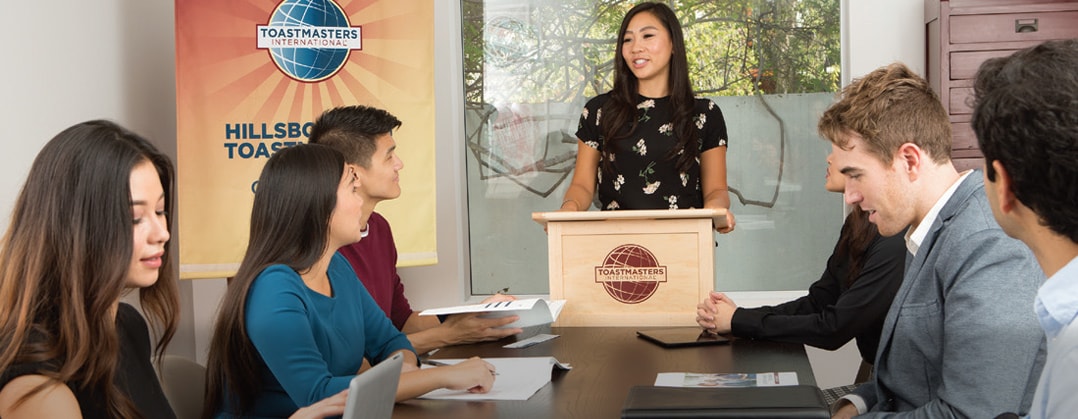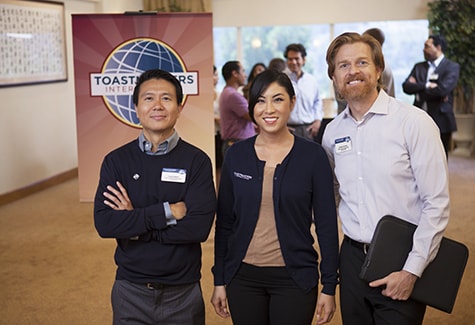An Education Program for the Future
Test pilot of REP content draws positive reviews.

This article is from the March 2016 edition of the Toastmaster magazine.
Ever since Ralph C. Smedley founded Toastmasters, education has been central to the organization’s mission. The goal has always been to help members develop and improve their communication and leadership skills through experiential learning.
The best is yet to come. Toastmasters is revitalizing its education program, and the end result will be improved opportunities for members to learn and grow. Benefits will include a learning experience tailored to members’ personal and professional goals, and the development of communication and leadership skills that are transferrable.
The revitalized education program (REP) stems from the Toastmasters Board of Directors’ 2010 strategic plan, which identifies the need to modernize the communication program and renew our focus on leadership. Three years ago, the REP team at World Headquarters began developing the educational content, and more than 250 member volunteers—called Learning Masters—offered valuable feed-back during the process.
The REP builds on the best of the cur-rent education program. The way club meetings work will stay fundamentally the same, and the program will maintain Toastmasters’ four guiding principles: experiential learning, self-paced learning, peer evaluation and mentoring.
Along with tailored learning and transferrable skills, the REP will offer members:
- A clearer path toward Toastmasters recognition and achievement awards
- Greater access to educational materials
- Expanded learning resources such as video and digital content
- Stronger mentoring and evaluation programs
“The revitalized education program is vital to our future,” says Past International President Pat Johnson, who led the Learning Masters group. “We must adapt to a changing world—and this is the best way to meet members’ needs in today’s global marketplace.”
The Learning Journey
Based on extensive research and membership surveys, the program’s learning paths have been mapped out meticulously. Once a member joins a club, he can take a self-assessment, which identifies a tailored learning path that meets his specific goals.
Learning paths correspond to the program’s five disciplines:
- Public Speaking + Management
- Public Speaking + Strategic Leadership
- Public Speaking + Interpersonal Communication
- Interpersonal Communication + Strategic Leadership
- Interpersonal Communication + Management
This type of educational journey gives members more control of the skills they can develop and enables them to master particular competencies that are transferrable.
There are 10 learning paths, and all paths include 14 projects. Each path contains five levels of achievement that build in complexity, allowing members to build on what they have learned.
In total, there will be 59 learning projects—a mix of those that are required and electives—in the revitalized education program. (Some projects are included in more than one path.) The Learning Masters reviewed each of the projects, but in addition, and for the first time, members other than the Learning Masters have now reviewed the educational content. And their feedback is resoundingly positive.
The REP team at World Headquarters recently completed a pilot to test the educational content. It marked the first time any of the learning projects were completed in the club setting. That is critical. Because the member experience is at the heart of Toastmasters, one of the pilot’s primary aims was to evaluate how project assignments fit with the club setting.
Pilot participants also provided feedback on the educational impact of projects, the functionality of the online content and the overall response to the REP. More than 800 members from 168 clubs participated in the pilot, which ended in December. The feedback was provided through project surveys. The REP team received 1,292 surveys—some members completed more than one project—from members in 79 districts across the world.
What Did They Say?
One member who completed the new “Ice Breaker” project wrote, “LOVE the practical info and speech development guidelines for this Ice Breaker project! I would have progressed far more quickly had this been available to me six years ago when I began [in Toastmasters].”
Another member praised the “Introduction to Toastmasters Mentoring” project: “It is the first time in a long time I have been able to speak about something ‘from the heart,’ which is what a mentor/mentee experience is … a very heartfelt and meaningful experience.”
Along with the positive input, members provided suggestions and constructive comments. For example, one Toastmaster offered suggestions on an assignment in the “Managing a Difficult Audience” project. The assignment calls for one or more club members to role-play during the speech, causing disruptions and interrupting the speaker.
“It was hard to do an actual 5-to-7-minute speech with four role players disturbing you,” wrote this participant. The assignment “did not say to limit [the members’] interruptions, so they kept at it again and again.… I would suggest a little more detailed instruction to the role players to make the project more realistic.”
World Headquarters staff is reviewing the pilot feedback and adjusting projects to better serve members’ educational goals and the club experience. Staff is also fine-tuning the new evaluation process—a key benefit of the program—within individual projects.
Blogs and Podcasts
A number of REP projects teach methods of communication that are increasingly popular around the world—methods that might be new to many members. One such project is “Write a Compelling Blog.” “I knew next to nothing about blogs when I began this project,” wrote one pilot participant. “I think the material was well-written for beginners like me.”
Another member said the “Create an Engaging Podcast” project was enlightening. “Most of the members of my club are not so active online and don’t listen to podcasts. For some it was the first time that they heard of podcasts.”
Learning Masters served as club liaisons for the content pilot. One Learning Master, Phoenix Miller, said the Podcast project helped her overcome her fear of new technology. At first, the project was difficult, she said, but she forged ahead, determined to succeed.
“When I presented my first podcast to my club, on alternative work spaces, I was overwhelmed at the positive reaction,” wrote Miller, a member of several clubs in North Carolina. “Some of the younger members asked what kind of software I was using. I beamed.
“I received my DTM last year. I was ready for my next challenge. This project opened up a whole new world for me to reach outside my club and outside Toastmasters.”
Online Testing
The REP’s Learning Management System (which enables members to use the program online) is being integrated with the educational content, and testing of the system will soon begin. The first phase of testing will simulate the user experience, identify any system bugs and how to correct them, and ensure the quality of the system and the REP in general.
Members will participate in a second phase of testing later this year to further ensure the quality of the program. The REP is scheduled to begin rolling out in phases by the end of the year. However, the program won’t launch until the organization is certain that the REP is completely ready for members. It’s an exciting time to be a Toastmaster, with an abundance of new learning opportunities on the horizon!
Author Bio
Paul Sterman is the senior editor of Toastmaster magazine.
"I knew next to nothing about blogs when I began this project. I think the material was well-written for beginners like me."
Ambassadors for Change

Learning Masters

